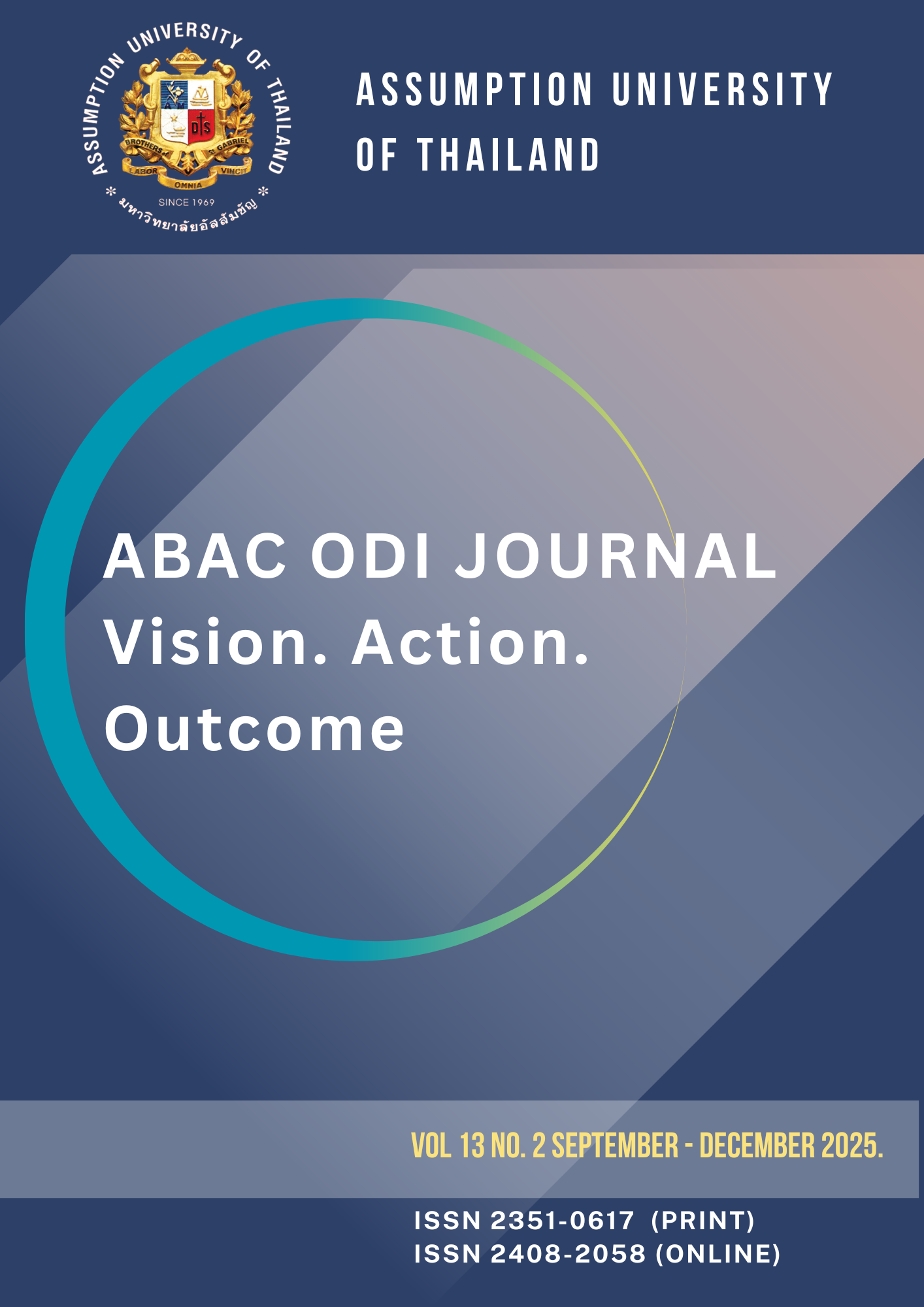Improving Student Online English Learning Engagement in Blended Learning Through Organization Development Interventions
DOI:
https://doi.org/10.14456/abacodijournal.2025.55Abstract
The purpose of this study is to investigate how to improve student online English learning engagement through organization development interventions (ODIs) at Zhejiang Yuexiu University (ZYU). The current research was conducted with four research objectives: to discover the current situation of goal setting (GS), help seeking (HS), time management (TM), self-assessment (SA) and online learning engagement; to design and implement appropriate organization development interventions for improving GS, HS, TM, SA and promoting online English learning engagement; to identify the differences in GS, HS, TM, SA and online learning engagement between Pre-ODI and Post-ODI. This research investigated 42 students. The independent variables were goal setting, help seeking, time management and self-assessment, and the dependent variable was online learning engagement, including cognitive engagement, affective engagement and behavioral engagement. This research applied both quantitative and qualitative methods. The results of the paired samples t test and thematic analysis indicated that there was a significant difference in GS (t=9.58, p<0.01), HS (t=7.87, p<0.01), TM (t=8.91, p<0.01), SA (t=9.75, p<0.01) and online learning engagement (t=10.31, p<0.01) between pre-ODI and post-ODI. Based on the research findings, recommendations were proposed to improve goal setting, help seeking, time management and self-assessment
References
Acosta, A. S., & Douthwaite, B. (2005). Appreciative inquiry: An approach for learning and change based on our own best practices. RePEc: Research Papers in Economics. https://doi.org/10.22004/ag.econ.52516
Almutairi, F., & White, S. (2018). How to measure student engagement in the context of blended-MOOC. Interactive Technology and Smart Education, 15(3), 262-278. https://doi.org/10.1108/itse-07-2018-0046
Bailey, R. R. (2017). Goal setting and action planning for health behavior change. American Journal of Lifestyle Medicine, 13(6), 615-618 https://doi.org/10.1177/1559827617729634
Baleghizadeh, S., & Masoun, A. (2014). The effect of self-assessment on EFL learners’ self-efficacy. TESL Canada Journal, 31(1), 42.https://doi.org/10.18806/tesl.v31i1.1166
Barnard, L., Lan, W. Y., To, Y. M., Paton, V. O., & Lai, S. L. (2009). Measuring self-regulation in online and blended learning environments. The Internet and Higher Education, 12(1), 1-6. https://doi.org/10.1016/j.iheduc.2008.10.005
Bonebright, D. A. (2010). 40 years of storming: a historical review of Tuckman’s model of small group development. Human Resource Development International, 13(1), 111-120. https://doi.org/10.1080/13678861003589099
Brown, A., Rich, M., & Holtham, C. (2013). Student engagement and learning Case study of a new module for business undergraduates at Cass business school. Journal of Management Development, 33(6), 603-609.
https://doi.org/10.1108/JMD-04-2014-0038
Budiman, A. N. A. (2023). Pre-service English teachers’ perceptions towards the effect of cross-cultural peer mentoring (A case of Indonesian Participants of Sea Teacher Batch 8, Pangasinan State University, the Philippines). Journal of Innovation Research and Knowledge, 3(1).
Caner, M. (2010). A blended learning model for teaching practice course. The Turkish Online Journal of Distance Education, 11(3), 78-97. https://doi.org/10.17718/tojde.66482
Christenson, S. L., Reschly, A. L., & Wylie, C. (2012). Handbook of Research on Student Engagement. Springer eBooks. https://doi.org/10.1007/978-1-4614-2018-7
Cooperrider, D. L., & Whitney, D. (2005). Appreciative Inquiry: A positive revolution in change.
Daumiller, M., Rinas, R., & Dresel, M. (2023). Relevance of students’ goals for learning engagement and knowledge gains in an online learning course. Behavioral Sciences, 13(2), 161. https://doi.org/10.3390/bs13020161
Effeney, G., Carroll, A., & Bahr, N. (2013). Self-regulated learning: Key strategies and their sources in a sample of adolescent males. Australian Journal of Educational and Developmental Psychology, 13, 58-74.
Fredricks, J. A., Blumenfeld, P. C., & Paris, A. H. (2004). School engagement: potential of the concept, state of the evidence. Review of Educational Research, 74(1), 59-109. https://doi.org/10.3102/00346543074001059
Ghazali, N. H. M. (2016). A Reliability and Validity of an instrument to evaluate the School-Based Assessment System: a pilot study. International Journal of Evaluation and Research in Education (IJERE), 5(2), 148. https://doi.org/10.11591/ijere.v5i2.4533
Hanafi, M., Azram, A. a. R., Omar, S. K., Nadri, H. N., Soopar, A. A., & Fuat, N. H. M. (2022). The impact of group work on students’ online engagement. International Journal of Academic Research in Business and Social Sciences, 12(8).
https://doi.org/10.6007/ijarbss/v12-i8/14619
Handoko, E., Gronseth, S., McNeil, S., Bonk, C. J., & Robin, B. (2019). Goal setting and MOOC completion. The International Review of Research in Open and Distributed Learning, 20(3). https://doi.org/10.19173/irrodl.v20i4.4270
Hentschke, H., & Stüttgen, M. C. (2011). Computation of measures of effect size for neuroscience data sets. European Journal of Neuroscience, 34(12), 1887-1894. https://doi.org/10.1111/j.1460-9568.2011.07902.x
Hou, M., & Li, H. (2017). Student engagement in online learning: A review. IEEE 2017 International Symposium on Educational Technology.https://doi.org/10.1109/iset.2017.17
Kurt, U., & Taş, Y. (2023). Students engagement in science during Covid-19 Pandemic: Role of self-efficacy beliefs and achievement goals. Journal of Science Learning, 6(1), 23-33. https://doi.org/10.17509/jsl.v6i1.51104
Li, R., Hassan, N. C., & Saharuddin, N. (2023). College student’s academic help-seeking behavior: A systematic literature review. Behavioral Sciences, 13(8), 637. https://doi.org/10.3390/bs13080637
Pengruck, L., Boonphak, K., & Sisan, B. (2019). Early childhood education: A confirmatory factor analysis concerning Thai administrators’ creative administration. Asia-Pacific Social Science Review, 19(1). https://doi.org/10.59588/2350-8329.1199
Schworm, S., & Gruber, H. (2011). e‐Learning in universities: Supporting help‐seeking processes by instructional prompts. British Journal of Educational Technology, 43(2), 272-281. https://doi.org/10.1111/j.1467-8535.2011.01176.x
Shahin, A., & Mahbod, M. A. (2007). Prioritization of key performance indicators. International Journal of Productivity and Performance Management, 56(3), 226-240.https://doi.org/10.1108/17410400710731437
Sun, J. C., & Rueda, R. (2011). Situational interest, computer self‐efficacy and self‐regulation: Their impact on student engagement in distance education. British Journal of Educational Technology, 43(2), 191-204.
https://doi.org/10.1111/j.1467 8535.2010.01157.x
Sun, W., Hong, J., Dong, Y., Huang, Y., & Fu, Q. (2022). Self-directed learning predicts online learning engagement in higher education mediated by perceived value of knowing learning goals. The Asia-Pacific Education Researcher, 32(3), 307-316.
https://doi.org/10.1007/s40299-022-00653-6
Zhang, Y., Guan, X., Ahmed, Z., Jobe, M. C., & Ahmed, O. (2022). The association between university students’ achievement goal orientation and academic engagement: Examining the mediating role of perceived school climate and academic self-efficacy. Sustainability, 14(10), 6304. https://doi.org/10.3390/su14106304
Zimmerman, B. J. (2002). Becoming a self-regulated learner: An overview. Theory Into Practice, 41(2), 64-70. https://doi.org/10.1207/s15430421tip4102_2




